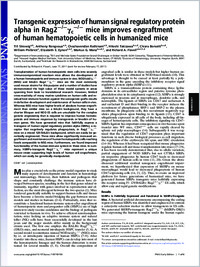Transgenic expression of human signal regulatory protein alpha in Rag2−/−γc −/− mice improves engraftment of human hematopoietic cells in humanized mice
- Strowig, Till Department of Immunobiology, Yale University School of Medicine, New Haven - Bill and Melinda Gates Foundation Grand Challenges in Global Health GC#4 Consortia, Yale University School of Medicine, New Haven
- Rongvaux, Anthony Department of Immunobiology, Yale University School of Medicine, New Haven - Bill and Melinda Gates Foundation Grand Challenges in Global Health GC#4 Consortia, Yale University School of Medicine, New Haven
- Rathinam, Chozhavendan Department of Immunobiology, Yale University School of Medicine, New Haven - Bill and Melinda Gates Foundation Grand Challenges in Global Health GC#4 Consortia, Yale University School of Medicine, New Haven
- Takizawa, Hitoshi Bill and Melinda Gates Foundation Grand Challenges in Global Health GC#4 Consortia, Yale University School of Medicine, New Haven - Division of Hematology, University Hospital Zurich, Zurich, Switzerland- Institute for Research in Biomedicine (IRB), Faculty of Biomedical Sciences, Università della Svizzera italiana, Switzerland
- Borsotti, Chiara Bill and Melinda Gates Foundation Grand Challenges in Global Health GC#4 Consortia, Yale University School of Medicine, New Haven - Division of Hematology, University Hospital Zurich, Zurich, Switzerland- Institute for Research in Biomedicine (IRB), Faculty of Biomedical Sciences, Università della Svizzera italiana, Switzerland
- Philbrick, William Department of Internal Medicine, Yale University School of Medicine, New Haven
- Eynon, Elizabeth E. Department of Immunobiology, Yale University School of Medicine, New Haven - Bill and Melinda Gates Foundation Grand Challenges in Global Health GC#4 Consortia, Yale University School of Medicine, New Haven - Howard Hughes Medical Institute, Yale University School of Medicine, New Haven
- Manz, Markus G. Bill and Melinda Gates Foundation Grand Challenges in Global Health GC#4 Consortia, Yale University School of Medicine, New Haven - Division of Hematology, University Hospital Zurich, Zurich, Switzerland - Institute for Research in Biomedicine (IRB), Faculty of Biomedical Sciences, Università della Svizzera italiana, Switzerland
- Flavell, Richard A. Department of Immunobiology, Yale University School of Medicine, New Haven - Bill and Melinda Gates Foundation Grand Challenges in Global Health GC#4 Consortia, Yale University School of Medicine, New Haven - The Howard Hughes Medical Institute, Yale University School of Medicine, New Haven
-
25.07.2011
Published in:
- Proceedings of the national academy of sciences of the United States of America. - 2011, vol. 108, no. 32, p. 13218-13223
English
Transplantation of human hematopoietic stem cells into severely immunocompromised newborn mice allows the development of a human hematopoietic and immune system in vivo. NOD/scid/γc−/− (NSG) and BALB/c Rag2−/ −γc−/− mice are the most commonly used mouse strains for this purpose and a number of studies have demonstrated the high value of these model systems in areas spanning from basic to translational research. However, limited cross-reactivity of many murine cytokines on human cells and residual host immune function against the xenogeneic grafts results in defective development and maintenance of human cells in vivo. Whereas NSG mice have higher levels of absolute human engraftment than similar mice on a BALB/c background, they have a shorter lifespan and NOD ES cells are unsuitable for the complex genetic engineering that is required to improve human hematopoiesis and immune responses by transgenesis or knockin of human genes. We have generated mice that faithfully express a transgene of human signal regulatory protein alpha (SIRPa), a receptor that negatively regulates phagocytosis, in Rag2−/−γc−/− mice on a mixed 129/BALB/c background, which can easily be genetically engineered. These mice allow significantly increased engraftment and maintenance of human hematopoietic cells reaching levels comparable to NSG mice. Furthermore, we found improved functionality of the human immune system in these mice. In summary, hSIRPa-transgenic Rag2−/−γc−/− mice represent a unique mouse strain supporting high levels of human cell engraftment, which can easily be genetically manipulated.
- Language
-
- English
- Classification
- Medicine
- License
-
License undefined
- Open access status
- green
- Identifiers
-
- RERO DOC 324418
- DOI 10.1073/pnas.1109769108
- ARK ark:/12658/srd1318781
- Persistent URL
- https://n2t.net/ark:/12658/srd1318781
Statistics
Document views: 216
File downloads:
- Texte intégral: 210
